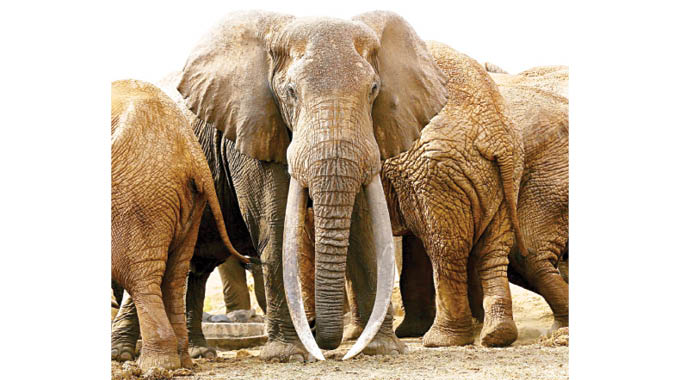US govt applauded for accepting elephant hunting trophy imports

Chronicle Correspondent
Johannesburg-based international award-winning environmental journalist, Emmanuel Koro has applauded on his twitter page, the recent decision made by the US Court of Appeals for the Washington DC’s Circuit, to allow elephant hunting trophy imports into the USA.
The decision was made following USA-based Safari Club International (SCI), together with other American hunters associations’ appeal against the Obama Administration imposed blanket ban on hunting trophy imports endangered species that didn’t accept a case-by-case importation policy that acknowledges that not all countries’ wildlife populations are endangered. Therefore, this landmark court decision is sweet and hard fought victory not only for the SCI but also for the African countries that benefit from the hunting industry.
“Animal rights groups have been defeated again,” said Koro. “This is a welcome recognition of hunting’s conservation benefits.”
The animal rights movement has continued to selfishly oppose wildlife hunting to suit their Western anti-use values that limit wildlife-rich and elephant overpopulated African countries’ opportunities to derive conservation and development benefits from the lucrative hunting industry.
They are still challenging the US court ruling, saying they would want to have elephant hunting trophy imports into that country banned again in future, should the Republican Party President Donald Trump lose the forthcoming USA presidential election and get replaced with a Democratic Party president.
“The ruling allows Fish and Wildlife Service [USA Government agency responsible for managing fish and wildlife for the American public] to avoid accountability and issue permits to import threatened species without involving or notifying the public,” said Stephen Hernick, senior attorney with an animal rights group Friends of Animals’ Wildlife Law Programme.
“This is particularly inappropriate because scientists believe that these species will not even survive in the wild 50 years from now.
The UN Convention on International Trade in Wild Species of Fauna and Flora (CITES) uses country-by-country case elephant population assessment method called split listing. According to this method, most Sadc countries are elephant over-populated.
“Hunting is an effective form of wildlife management that involves the harvesting of old wildlife that would likely soon die of natural causes and that would also be replaced by younger species without causing population decline,” said Koro.
According to the 1997 World Wide Fund For Nature (WWF) wildlife hunting quota-setting manual, the main purpose of a quota is to identify the number of animals that can be killed without reducing the population. This depends on: the number of animals living in the area, called the “population”, while the rate at which these animals can be harvested is called the percentage “off-take rate”.
Normally the “off-take rate” is fixed at either equal to or slightly lower than the growth rate. In this way, while the growth in population size may be slowed down, the total number of animals in the population does not fall. The quota can, therefore, be considered
Koro said that we need to continue watching and challenging the animal rights movement’s use of lies, in order to justify the ban on elephant hunting trophy imports in the USA in the future.
“Right now the pro-hunting African countries, particularly those from Southern Africa, should celebrate the sweet victory over the anti-hunting animal rights movement whose lies that hunting harms wildlife have been totally dismissed by the DC Circuit Court with the contempt that they deserve,” he said.
“The USA government should be commended for acknowledging that wildlife hunting contributes to conservation and for accepting elephant hunting trophy imports.”
Fed-up with the Western animal rights movement’s arrogant, neocolonial and racist Western attitude towards Africa that makes them think that Africa must continue to be told how to manage and use its wildlife, Koro recently began exposing how the Western animal rights movement’s anti-wildlife use stance is harming conservation and development in Africa.
In his bravely written and highly rated book Western Celebration of African Poverty — Animal Rights Versus Human Rights that former CITES Secretary-General Eugene Lapointe recommends as a must-read for everyone who loves wildlife, Koro exposes the criminal and darks secrets of the animal rights movement. He points out that the anti-hunting animal rights movement is more harmful to wildlife than poachers.
He observes that the fate of African wildlife, including elephants and rhinos lies in the hands of communities that co-exist with it. Therefore, he argues correctly that by banning hunting the animal rights groups harmfully take away hunting’s conservation and development benefits.
Without benefits from hunting, communities that co-exit with wildlife see no reason to protect it from poachers and sadly would rather collaborate with them to poach.
Therefore, Koro concludes that Africa’s wildlife conservation secrets lie in allowing communities that co-exist with wildlife to benefit from it, through activities such as trophy hunting.
He cites the unfortunate five-year-period in which Botswana suffered the worst wildlife revenge killings by rural communities that were angered by Botswana’s former President Ian Khama animal rights influenced 2014 hunting ban that his successor, President Masisi lifted to benefit the communities and save the country’s wildlife in May 2019.
Speaking to the Western animal rights movement representatives in the USA in 2019 who were protesting against his lifting of the hunting ban, President Masisi said that Botswana has the largest elephant population in the world, about 130 000, despite being semi-arid. Therefore, the world should come to Botswana to learn how to look after elephants. President Masisi eloquently explained to the anti-use Western world how Botswana was successfully looking after its people and wildlife.
He dispelled the Western animal rights groups’ lies that hunting would destroy Botswana’s elephant population. President Masisi said that CITES only gives Botswana permission to hunt 400 elephants annually.
This does not pose a threat to its 130 000 elephant population that is enjoying a three percent annual growth rate.
In his book, Koro observes that the hunting industry has brought unprecedented conservation and development benefits that are being felt at both urban and rural levels in Southern Africa. He observes that at rural level schools have been built using hunting revenue and have produced medical doctors, accountants and professional hunters who are currently contributing to their countries’ socioeconomic development.
In Sadc countries’ urban areas such as Victoria Falls, Livingstone, Kazungula and Lusaka, hunting employees own businesses and upmarket houses. They are also sending their children to elite universities worldwide.
Allowing communities that benefit from wildlife is a mindset conservation model. Koro notes that this has transformed absolute poachers into absolute wildlife conservationists. One of these wildlife revenue beneficiaries was the late Chief Luckson Masule of Botswana’s Kavimba Village neighbouring Botswana’s iconic Chobe National Park.
He confessed that he was once a poacher but that benefits from wildlife transformed him into a conservation champion in his community.
Across the Botswana border on the Namibian side’s Caprivi Strip, Koro also met the late leader of Salambala Conservancy, Mr George Mutwa. He, like Chief Masule of Botswana, also admitted that he was a former poacher, but wildlife benefits transformed him into an anti-poaching advocate. Some of the socio- economic benefits that they enjoyed include poverty alleviation initiatives such as employment creation, skills development, purchase of grinding mills, ambulances, the building of community lodges and campsites, and the sinking of boreholes and road construction.
In October 2019, Koro visited Namibian rural conservancies and was happy to learn that benefits from wildlife were still changing mind-sets in favour of conservation. The Namibian communities have continued to impressively grab the opportunity of turning their seemingly lifeless semi-desert rural landscapes into rare islands of diminishing poverty, despite the Western animal rights groups’ hunting ban threats.
“In 2017 Namibia’s 87 rural conservancies earned a total of US$8 854 949,00,” according to the Namibian Association of Community-based Natural Resources Management (CBNRM) Support Organisations (NACSO) 2017 State of Conservancy Report.
Among other things, the money was used to support community conservation and community development projects, ranging from boreholes for wildlife and communities to barriers to protect livestock from lion, hyena and leopard attacks during the night.
“The benefits from hunting have brought never-seen-before mind-set changes for people in my conservancy, from poachers to champions of wildlife conservation,” said the Kunene Region Anabeb Conservancy chairman Mr Ovehi Kasaona. “I remember poaching a big kudu for meat. My friends, including my father and grandfather poached for meat. My uncle even poached for rhino horn sale. In the past when we saw wildlife we saw meat for the pot. But now we are seeing tourism business because we are making money from wildlife-based businesses, including lodges, game drives and hunting.”
Koro said that wildlife-rich and elephant overpopulated Sadc countries can then argue further, that this mindset changing conservation model can be extended to trade in ivory and rhino horn as this would further enhance rural communities incentives to conserve wildlife and most importantly generate wildlife conservation income that the Covid-19 pandemic severely damaged African countries currently don’t have.
Koro warned that if the continent’s wildlife-rich and elephant overpopulated countries are not given the opportunity to trade in their earth-shattering and dust-gathering quantities of ivory and rhino horn, then history would judge the world harshly for having sentenced African wildlife to death by denying the continent an excellent opportunity to trade in its abundant quantities of ivory and rhino horn harvested from viable populations of such species.
“The continued ban on ivory and rhino horn has never saved a single elephant or rhino,” said Koro.
“It has failed to deal with the demand for ivory and rhino horn and has ironically continued to help increase elephant and rhino poaching, including illegal ivory and rhino horn trade. The media is awash with such stories almost every week. Therefore, African elephants could sadly be ‘mowed’ down by poachers guns in unprecedented numbers in the Covid-19 era in which cash-starved poaching syndicates worldwide are going to increase their poaching activities at a time when most African countries’ Covid-19 damaged economies virtually have no budgets to save wildlife but to save human lives.”
Trade, not aid, will save African elephants and rhinos.
“We are therefore appealing to the Trump administration that has refreshingly acknowledged the conservation value of sustainable use through elephant hunting to help Africa achieve this by also supporting the generation of wildlife conservation income through ivory and rhino horn trade,” said Koro.











Comments